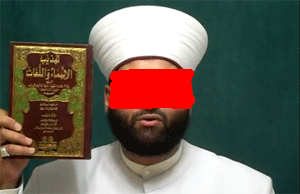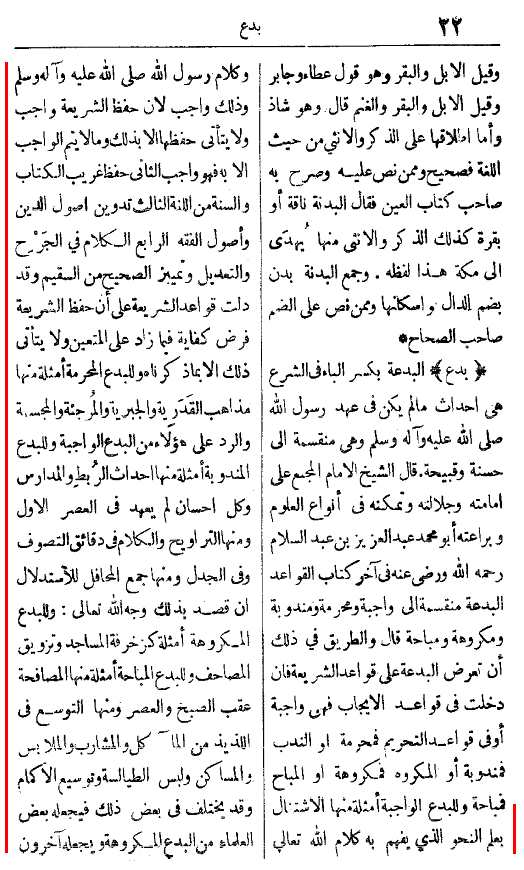
 We've met this individual before somewhere, and he's running a very slick operation on the tube. We even had to commend him for his slickness, because it is very
professional - when you are out to swindle, it simply has to be, there
is no other choice. As most people's attention spans have dwindled to
literally minutes and seeking knowledge for them has become reduced to
watching byte-sized vids on the tube (because reading and studying books
is so excruciatingly painful and boring), the situation is ripe
for individuals such as this one to come along and play the pied-piper.
Citing isolated, decontextualized statements of the Scholars or
brandishing their phraseology whilst concealing the reality of what these scholars meant by it
is the method by which this individual and countless others deceive and
misguide the people away from the Prophetic Sunnah and instead to the
misguided innovations they have entered into the religion. He is holding
up the book of Imaam al-Nawawi, (تهذيب الأسماء واللغات) and is impressing upon the byte-sized deen-learner how Imam al-Nawawi,
allegedly, is sanctioning the innovations (in worship) that he and his
likes spread amongst the Ummah. The reality is not as simple as he makes
it out to be and is in fact otherwise, and we will address this matter,
by Allaah's permission in this article.
We've met this individual before somewhere, and he's running a very slick operation on the tube. We even had to commend him for his slickness, because it is very
professional - when you are out to swindle, it simply has to be, there
is no other choice. As most people's attention spans have dwindled to
literally minutes and seeking knowledge for them has become reduced to
watching byte-sized vids on the tube (because reading and studying books
is so excruciatingly painful and boring), the situation is ripe
for individuals such as this one to come along and play the pied-piper.
Citing isolated, decontextualized statements of the Scholars or
brandishing their phraseology whilst concealing the reality of what these scholars meant by it
is the method by which this individual and countless others deceive and
misguide the people away from the Prophetic Sunnah and instead to the
misguided innovations they have entered into the religion. He is holding
up the book of Imaam al-Nawawi, (تهذيب الأسماء واللغات) and is impressing upon the byte-sized deen-learner how Imam al-Nawawi,
allegedly, is sanctioning the innovations (in worship) that he and his
likes spread amongst the Ummah. The reality is not as simple as he makes
it out to be and is in fact otherwise, and we will address this matter,
by Allaah's permission in this article. Revision of the Basics
So far we have established that whenever the term "praiseworthy innovation" (البدعة المحمودة) and "good innovation" (البدعة الحسنة) is used in the language of certain scholars, they are using it purely in its linguistic sense (not Shariah sense). This we established from Ibn Hajar (see here) and also Ibn Rajab (see quote in this article). Further, we established that by inspecting and examining the actual examples given by those who categorize innovation (البدعة) into obligatory (الواجب), recommended (المندوب) and permissible (المباح), it is very clear that they are in fact speaking of either a) something that is not an innovation in the Shariah sense at all (e.g. tarawih prayer in congregation in Ramadan in the mosque) or b) something that comes under the topic of al-maslahah al-mursalah, a matter of broad public interest by which specified Shariah goals are served and by which the five necessities (religion, life, intellect, wealth and lineage) are preserved (see this article for understanding and this article for illustrative examples given by al-Izz bin Abd al-Salam to show what he actually intended). This is where schools, hospices, teaching Arabic grammar and so on enter into as explained by the Scholars who speak of innovation (bidah) having classifications. If you have got all of that in the bag, then grab your stick, join us, and lets collectively give this doubt (of the Innovators) a pounding and send it back from where it came ...
Understanding the Deceptive Tactics Of These Innovators
In order to understand how these people are operating we need to know that those scholars whose words they are employing (al-Nawawi, al-Izz bin Abd al-Salam, Ibn Hajar etc.) have two types of statements:
- The first type: A mere mention of bidah being either "praiseworthy innovation" (البدعة المحمودة) or "blameworthy innovation" (البدعة المذمومة) or bidah being of categories such as obligatory (الواجب), recommended (المندوب) and permissible (المباح) but without any further elaboration and giving of illustrative examples, because within the context in which they are writing, they are only intending to make a quick hint or reference to the matter.
- The second type: A mention of those phrases and terms but this time with full elaboration and illustrative examples which reveal their intent and which show exactly what their objective is in using these terms and classifications.
Practical Illustration of the Academic Fraud
The deceptive individual pictured earlier has posted a few videos and in each of them he has cited a quote from al-Nawawi from the same place in one of his books (تهذيب الأسماء واللغات). Al-Nawawi is discussing the entry (بدع) and he does actually elaborate upon it in detail, but this crooked Habashite Sufi pictured above eliminated the part where al-Nawawi explains the intent behind the classification (through a full citation from al-Izz bin Abd al-Salam). Each quote that we bring below is the subject of a separate video created by these people. Their intent is to isolate each of the general statements that offer no detail or explanation as to the intent and purpose behind the classification of these scholars so that the intended audience thinks "how numerous are these statements that legitimize innovation" when they see all these individual videos. So lets now analyze those isolated statements that are used as part of the bait.
1st Statement of Imam al-Nawawi from Tahdhib al-Asmaa wal-Lughaat
The first quote from al-Nawawi is from his book (تهذيب الأسماء واللغات), Idarah al-Tibaa'ah al-Muniriyyah, (3/22), and this is presented in its own short video on the tube:
البدعة بكسر الباء في الشرع هي إحداث ما لم يكن في عهد رسول الله وهي منقسمة إلى حسنة وقبيحة
So this quote is isolated like this and presented and a person thinks, "Hey, yes they are right, there is "good bidah" in the religion," but little does the person know what exactly al-Nawawi (and others) intend by this phrase - that part is kept hidden.Al-Bidah, with a kasrah on the letter baa, in the Shariah it is the introduction (invention) of that which is not found in the era of the Messenger of Allaah, and it is divided into [that which is] good and [that which is] repugnant.
2nd Statement of Imam al-Nawawi from Tahdhib al-Asmaa wal-Lughaat
In another separate video, from the same location as above, this next passage is quoted from al-Nawawi:
قال الشيخ الإمام المجمع على إمامته وجلالته وتمكنه في أنواع العلوم وبراعته أبو محمد عبد العزيز بن عبد السلام رحمه الله ورضي عنه في آخر كتاب القواعد : البدعة منقسمة إلى واجبة ومحرمة ومندوبة ومكروهة ومباحة، والطريق في ذلك أن تعرض البدعة على قواعد الشريعة فإن دخلت في قواعد الإيجاب فهي واجبة أو في قواعد التحريم فمحرمة أو الندب فمندوبة أو في المكروه فمكروهة أو المباح فمباحة
This is the well known statement of al-Izz bin Abd al-Salaam which has been quoted from him by other authorities such as Ibn Hajar in al-Fath, and al-Shatibi also quotes it (and proceeds to refute it and show that it is itself an innovation having no proof).The Shaykh, the Imaam whose leadership, lofty stature, and proficiency and skill in a variety of sciences is agreed upon, Abu Muhammad Abd al-Aziz bin Abd al-Asalam (rahimahullaah wa radiya anhu) said, at the end of his book, al-Qawa'id:
Innovation is divided into obligatory (waajibah), unlawful (muharramah), recommended (makruhah), disliked (makruhah) and permitted (mubaahah), and the way to knowing that is to view the innovation in light of the Shariah principles, and so if it enters into the principles of obligation, then it is obligatory, or [if it enters into] the principles of unlawfulness, then it is unlawful, or if recommended, then recommended, or if [its falls into] the disliked, then disliked, or the permitted, then permitted.
3rd Statement of Imam al-Nawawi from Tahdhib al-Asmaa wal-Lughaat
Then in a separate video another section of this passage from al-Nawawi is isolated and presented, and this time it is al-Nawawi's citation of the statement of al-Shafi'i through al-Bayhaqi:
وروى البيهقي بإسناده في مناقب الشافعي عن الشافعي رضي الله عنه قال : المحدثات من الأمور ضربان، أحدهما ما أُحدث مما يخالف كتابا أو سنة أو أثرا أو اجماعا فهذه البدعة الضلالة، والثانية ما أحدث من الخير لا خلاف فيه لواحد من العلماء وهذه محدثة غير مذمومة، وقد قال عمر رضي الله عنة في قيام شهر رمضان: نعمتُ البدعة هذه، يعني أنها محدثة لم تكن
We have already addressed this quote in the article on the statements of al-Shafi'i (see here) so please refer to that. However, it is clear that al-Shafi'i's words are in relation to bidah from a purely linguistic meaning and this is very clear from what he says at the very end when he quotes the saying of Umar and then says, (يعني أنها محدثة لم تكن), "meaning, that it is newly-introduced and was not previously done..." and al-Shafi'i knows that this was in fact done by the Messenger (alayhis salam) but abandoned because he (alayhis salaam) feared it might become wajib (obligatory) upon his Ummah. So this act of worship has specific proof in the Sunnah, but its re-enactment is referred to by al-Shafi'i as "bidah" purely from a linguistic meaning and not a Shariah meaning, and this act does not have opposition to the Shariah, rather it is in perfect agreement with the Shariah, with the Prophetic Sunnah, in its foundations and details. Hence, it is not an innovation in the blameworthy sense.Al-Bayhaqi reports with his chain in Manaqib al-Shafi'i from al-Shafi'i (radiallaahu anhu) that he said:
Newly-invented matters are of two types: The first of them is what opposes [something from] the Book, or [something from] the Sunnah, or a narration [from the Companions], or [a matter of] consensus, this is the misguided innovation. And the second is what has been introduced of goodness and there is not a single scholar who opposes it. This is newly-introduced yet not blameworthy and Umar (radiallaahu anhu) had said about the qiyam (al-layl) in the month of Ramadan, "What an excellent innovation this is," meaning, that it is newly-introduced and was not previously done.
All the above three quotes were all from the same section. But what was left out? Well lets go and take a look!
What Has Been Deliberately Omitted!
That's right, the most crucial part of it all, which actually explains the classifications that these Shafi'ite jurists were making use of, even thought it is right there, sandwiched between all those quotes you have read above, it is not presented and mostly kept from view. The reason is plainly obvious, because the game would be over and the fraud would be plain to see. We have already alluded to this elaboration by al-Izz bin Abd al-Salam in the articles dedicate to his statements (see Part 4 and opening of Part 5). Here is the full entry:

 Deception Alert: Note that this Habashi Sufi swindler did not complete al-Nawawi's citation from
Deception Alert: Note that this Habashi Sufi swindler did not complete al-Nawawi's citation from 



 It is a common misconception with some non-Muslims that Islam would
not have millions of adherents all over the world, if it had not been spread by
the use of force.
It is a common misconception with some non-Muslims that Islam would
not have millions of adherents all over the world, if it had not been spread by
the use of force. The Bible is the sacred scripture of Judaism and
Christianity. The Christian Bible consists of the Old Testament and the New
Testament, with the Roman Catholic and Eastern Orthodox versions of the Old
Testament being slightly larger because of their acceptance of certain books not
accepted as scripture by Protestants. The Jewish Bible includes only the books
known to Christians as the Old Testament. Furthermore, the arrangements of the
Jewish and Christian canons differ considerably.
The Bible is the sacred scripture of Judaism and
Christianity. The Christian Bible consists of the Old Testament and the New
Testament, with the Roman Catholic and Eastern Orthodox versions of the Old
Testament being slightly larger because of their acceptance of certain books not
accepted as scripture by Protestants. The Jewish Bible includes only the books
known to Christians as the Old Testament. Furthermore, the arrangements of the
Jewish and Christian canons differ considerably.


 Islam
defines a miracle as an extraordinary act or event that is contrary to the laws
of nature and can only come about through the direct intervention of God
Almighty Himself. The Arabic word for miracle is mu’jizah. It stems
from the word ajz, meaning something that incapacitates, cannot be resisted,
unique. According to Islam, miracles are performed by the permission of God,
by the Prophets of God. Miracles are not magic, which is by definition a trick
or illusion, nor is a miracle an event brought about by a learned righteous
people who are not Prophets of God. These events are called karamahs. Thus
we find three distinct categories, miracles, karamahs and magic.
Islam
defines a miracle as an extraordinary act or event that is contrary to the laws
of nature and can only come about through the direct intervention of God
Almighty Himself. The Arabic word for miracle is mu’jizah. It stems
from the word ajz, meaning something that incapacitates, cannot be resisted,
unique. According to Islam, miracles are performed by the permission of God,
by the Prophets of God. Miracles are not magic, which is by definition a trick
or illusion, nor is a miracle an event brought about by a learned righteous
people who are not Prophets of God. These events are called karamahs. Thus
we find three distinct categories, miracles, karamahs and magic.



































